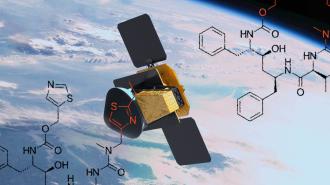It took seven months longer than expected to get it home, but Varda Space Industries has finally retrieved the medication it manufactured in space — and according to the company’s analysis, the mission was a major success.
“The one-liner is…them space drugs cooked real good,” tweeted Delian Asparouhov, one of the California startup’s co-founders.
Space drugs: In June 2023, a SpaceX rocket deployed a first-of-its-kind spacecraft designed to autonomously synthesize a drug — the HIV-AIDS medication ritonavir — while in Earth’s orbit.
Varda had built the craft to demonstrate how “space factories” could autonomously produce products that are easier to manufacture in the absence of gravity, starting with certain pharmaceuticals but eventually expanding to fiber optic cables, semiconductors, and more.
“This is our first step in commercializing microgravity drug development.”
Varda Space Industries
Slow burn: The space factory was supposed to return to Earth about a month after launch, but issues with regulators delayed the homecoming until February 2024.
Varda has now had time to study its space drugs and has shared a detailed report on the preprint server ChemRxiv. The short story, though, is that the ritonavir was successfully synthesized and remained stable throughout the reentry process.
“Our process and hardware performed flawlessly throughout in-orbit operations, reentry, and recovery operations,” tweeted Varda on March 20.
Looking ahead: Now that Varda has demonstrated that its space factory works as hoped, it’s eager to begin using the spacecraft to manufacture more space drugs.
“This is our first step in commercializing microgravity drug development,” tweeted Varda. “Our mission is to now enable cost-effective high-cadence access to enable next-generation therapeutics.”
We’d love to hear from you! If you have a comment about this article or if you have a tip for a future Freethink story, please email us at tips@freethink.com.
